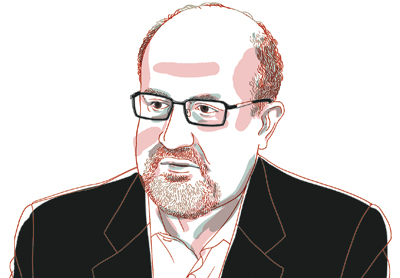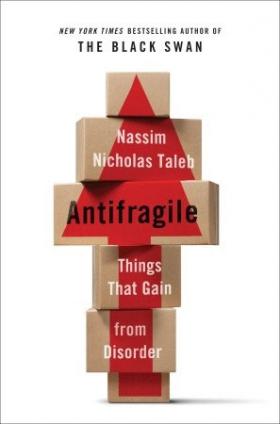This is from a couple of days ago at the The Chronicle Review, a sort of but not really interview with noted risk engineering specialist and anti-academician Nassim Taleb, author of The Black Swan: Second Edition: The Impact of the Highly Improbable: With a new section: "On Robustness and Fragility" and his new book, Antifragile: Things That Gain from Disorder.
Taleb is a bit of a curmudgeon, which is not a bad trait in an author who seems to hate more things than he likes - but there are some things more than others:
editors who "overedit," when what they should really do is hunt for typos; unctuous, fawning travel assistants; "bourgeois bohemian bonus earners"; meetings of any kind; appointments of any kind; doctors; Paul Krugman; Thomas Friedman; nerds; bureaucrats; air conditioning; television; soccer moms; smooth surfaces; Harvard Business School; business schools in general; bankers at the Federal Reserve; bankers in general; economists; sissies; fakes; "bureaucrato-journalistic" talk; Robert Rubin; Google News; marketing; neckties; "the inexorable disloyalty of Mother Nature"; regular shoes.I guess we'll have to read the book to know why these things and people made the list.
This Is Not a Profile of Nassim Taleb
By Tom Bartlett

This is a pretty long and interesting article, so here is only a section of it. Follow the link in the title above to see the whole piece.
Taleb is in the university but not of it. He spent the first couple decades of his career as a derivatives trader before turning to scholarship and essay writing in his mid-40s. Taleb is a professor of risk engineering at the Polytechnic Institute of New York University. Despite his wall of degrees (he has an M.B.A. from the University of Pennsylvania's Wharton School and a doctorate from the University of Paris), he believes that universities propagate "touristification," another term he coined, a phenomenon that occurs when what should be an exciting exploration turns into a programmatic exercise. It's better to be an adventurer than a tourist. Education isn't the only result of this modern sin; gym machines and "the electronic calendar" fall short as well.Read the whole article.
Taleb has a low opinion of most professors. He titles one section of the new book "The Charlatan, the Academic, and the Showman." In a chart, Taleb divides professions into three categories: fragile, robust, and antifragile. It's bad to be fragile, better to be robust, best to be antifragile. Artists and writers are antifragile. Postal employees and truck drivers are robust. Academics, bureaucrats, and the pope are fragile. Benedict, beware.
Most of Taleb's ire is directed at business schools, specifically the one at Harvard. At Harvard they "lecture birds to fly," then arrogantly claim credit when the fledglings become airborne. He rails against the "Soviet-Harvard delusion," linking an institution that's graduated thousands with a state that killed millions. What is the delusion, exactly? It is a belief in a top-down system that tries to control and protect, purportedly for mankind's benefit, thereby eliminating the natural stressors and necessary randomness that create strength and encourage enterprise. Dekulakization and course catalogs are symptoms of the same ailment.
Taleb has no patience for so-called structured learning. "Only the autodidacts are free," he writes in the book. He pursued his real education in his spare time, doing only as much as was required to pass his courses. At 13, he set himself a goal of reading for 30 to 60 hours a week, pretty much a full-time job. To prove that he hit the books with enthusiasm, Taleb ticks off the names of more than 30 great writers he has read. We don't learn much about what he gleaned from this ardent page-turning or which authors influenced his own style. He does give the following assessment of the work of Austrian novelist Stefan Zweig: "didn't like."
Actually, Antifragile feels like a compendium of people and things Taleb doesn't like. He is, for instance, annoyed by editors who "overedit," when what they should really do is hunt for typos; unctuous, fawning travel assistants; "bourgeois bohemian bonus earners"; meetings of any kind; appointments of any kind; doctors; Paul Krugman; Thomas Friedman; nerds; bureaucrats; air conditioning; television; soccer moms; smooth surfaces; Harvard Business School; business schools in general; bankers at the Federal Reserve; bankers in general; economists; sissies; fakes; "bureaucrato-journalistic" talk; Robert Rubin; Google News; marketing; neckties; "the inexorable disloyalty of Mother Nature"; regular shoes.
The social sciences make the list, too. He contrasts them with "smart" sciences, like physics. He mocks social scientists as mired in "petty obsessions, envy, and icy-cold hatreds," contrasting the small-mindedness of academe with the joie de vivre of the business world. "My experience is that money and transactions purify relations," he writes. "Ideas and abstract matters like 'recognition' and 'credit' warp them, creating an atmosphere of perpetual rivalry." In our interview, he went even further, saying he would "shut down" the social sciences. "Those guys are living in their own world," he said. "That is the truth. You don't need them."
I pointed out that he praises some psychologists, like Daniel Kahneman, and regularly refers to psychological concepts in Antifragile. Would he padlock the psych labs, too? No, he told me. "Psychology is more empirical," he clarified. Sociologists, on the other hand, would presumably be better off delivering mail.
He saves his iciest hate for economists. Taleb has no use for the "charlatanic" field, comparing economic research to medieval medicine. Economists are, in his estimation, weak, ignorant, fearful, and generally pathetic. At one point he fantasizes about beating up an economist in public.
Taleb singles out his least-favorite economists, including Robert C. Merton, a professor of finance at MIT, formerly of Harvard, and Myron Scholes, a professor emeritus of finance at Stanford, who jointly received the Nobel Prize in 1997 for their model of valuing derivatives that's designed to hedge against risk. Merton is "serious, mechanistic, boring," according to Taleb, and the two used "fictional mathematics" in their research. He calls this "unsettling" in a footnote, though in the earlier draft he sent me he used a harsher word. I'd wager that punch may have been pulled by Random House's legal department. Merton didn't return my messages, and Scholes politely declined to comment.
Gary Pisano, however, was willing to talk. Pisano, a professor of business administration at Harvard, is singled out in the book for his "dangerous" thinking; Taleb hammers him for supposedly misunderstanding the market for biotechnology. Pisano told me Taleb didn't know what he was talking about. "His argument is about these rare events that generate huge returns," he said. "That doesn't happen in biotech." The specifics of that debate aside, Pisano shrugged off the criticism and said he had enjoyed Taleb's work in the past: "I think he writes some very interesting and provocative things, but I think it gets a little lost in the manner."
The idea that Taleb's insights are sometimes overwhelmed by his belligerence is a longstanding criticism. Articles published in the American Statistician soon after The Black Swan appeared chastised him for his alleged ignorance of "entire subfields of statistics," committing mathematical errors, and lobbing "gratuitous insults" at statisticians. The opprobrium was mixed with gratitude that, whatever his faults, Taleb had managed to shine a bright light on an arcane topic. Still, you got the sense that statisticians were smarting. Taleb's fans—and there are many of them—see his abrasiveness as proof that he doesn't tolerate nonsense. They show up in droves to hear him speak, leave rapturous reviews on Amazon, and praise his television appearances. One YouTube commenter put it succinctly: "He's so awesome."
While Taleb dislikes the university system and doesn't respect career academics, he's not against education per se. Studying mathematics is fine for its own sake. And it's worthwhile to read the classics. But modern scholarship is bewitched by novel findings—what Taleb dubs "neomania"—and researchers are driven by their need to publish, perverting their efforts and tainting the outcome. "How can knowledge be something you do for professional advancement?" he asked. But, you might counter, Taleb is a professor at a university who publishes in journals. It would be one thing if he were blogging from a cabin somewhere, but isn't he part of the problem he's identified?
Ah, but he doesn't publish papers to advance his career. They are technical addenda to his popular books. "I ban myself from publishing anything outside of these footnotes," he writes in Antifragile. Because of his success, he is not beholden to deans and committees or anyone else, for that matter. "You cannot rely on external confirmation and have a happy life," he told me. "I don't rely on external confirmation, and I have a happy life."

No comments:
Post a Comment